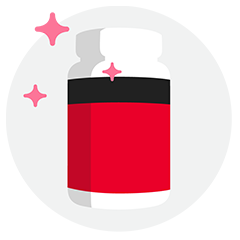What’s the difference between Candidiasis and leaky gut syndrome?

Candida overgrowth and leaky gut syndrome share many similarities. Both can be triggered by the same causes, including diet, stress, and medication. They can exist at the same time and share overlapping symptoms, therefore having similar treatment plans. To make them even a touch more indistinguishable, they can both be difficult to diagnose, with health practitioners not always recognizing them as illnesses or medical conditions that require a treatment plan. Acknowledging their similarities can help us differentiate between the two, and answer an important question: does one cause the other?
What is Candida?
Candida, or Candida albicans, is a type of yeast. It lives on our skin and can be found inside the body in areas like the mouth, throat, gastrointestinal tract, and genitals. Candida is present naturally, and in small amounts is considered harmless. However, when this otherwise harmless fungi grows out of control, it results in an infection called Candidiasis.
Normally, Candida overgrowth is limited due to the body’s immune system – a healthy immune system fights early signs of fungal infection. Existing flora also helps keep the opportunistic Candida albicans in check by producing substances that inhibit its growth. However, a change in the gut, oral, and genital microbiotas can lead to the opportunity of overgrowth for this specific yeast.
5 common symptoms of Candidiasis to look out for
Despite the “Candida conundrum” of some medical practitioners not diagnosing Candida overgrowth, a combination of the following symptoms can help identify it:
Oral thrush: Characterized by white bumpy patches, oral thrush is usually located in the mouth or throat, and can be painful.
Digestive issues: Bloating, gas, nausea, constipation, and/or diarrhea can all result from Candida overgrowth’s effect on digestion.
Recurring infections: Frequent infections on the skin or nails, or in the genitals or urinary tract, can result from the imbalance caused by Candidiasis.
Chronic aches and joint pain: A prolonged and untreated case of Candida overgrowth can cause yeast cells to enter the bloodstream, resulting in swelling and pain to the joints.
Inexplicable fatigue: Chronic fatigue can be the result of a weakened immune system, which Candida thrives in.
What is leaky gut syndrome?
Leaky gut syndrome, or increased intestinal permeability, is a condition in which the intestinal lining becomes compromised as a result of an imbalanced gut microbiome. A damaged lining allows toxins, bacteria, and partially digested foods to travel to the bloodstream. This can potentially trigger inflammation and affect gastrointestinal health, as well as instigate conditions beyond the gut—even affecting mental health.
5 common symptoms of leaky gut syndrome to look out for
Leaky gut syndrome has yet to be officially labeled a medical condition, making its diagnosis a little trickier. However, the following symptoms are typically associated with increased intestinal permeability, and can help shed some light:
Nutritional deficiencies: A damaged gut barrier function can lead to a lack of proper nutrient absorption, such as iron and vitamin B12.
Fatigue: The deficiencies of key nutrients can lead to a chronic state of fatigue and brain fog.
Digestive issues: As a leaky gut can stem from an unbalanced gut microbiome, digestive disorders such as irritable bowel syndrome (IBS) can arise, causing chronic bloating, gas, and cramping.
Skin issues: Leaky gut can cause inflammation, which triggers immune responses that can result in skin conditions such as acne or rashes.
Allergies and sensitivities: An impaired intestinal lining contributes to the development of allergies, intolerances, and sensitivities as the components that enter the bloodstream can activate our immune response, producing antibodies.
Candida and leaky gut: which comes first?
Candidiasis and leaky gut syndrome share overlapping symptoms, causes, and can also co-exist. While they are different conditions, the connection has led to a common question: Does Candida overgrowth lead to leaky gut syndrome, or does an impaired gut barrier lead to an overgrowth of yeast?
Leaky gut syndrome is usually the consequence of a compromised gut flora. Therefore, it is understandable that Candidiasis is commonly portrayed as the “cause” in this relationship, establishing the initial overgrowth. Yeast overgrowth leads to microbiome dysbiosis, causing increased intestinal permeability. If left untreated, Candida overgrowth can reach a more advanced stage in which its roots push the cells of the intestinal wall apart, leading to macromolecules being released into the bloodstream.
However, the relationship between Candida and leaky gut is not always as black and white. When looking at a case of a high sugar diet, the situation can be reversed. While high sugar consumption can contribute to Candida overgrowth, it is not considered a direct cause of the condition. Instead, a high sugar diet can lead to leaky gut syndrome, which in turn results in poor digestion and Candida growth. Even though the high sugar diet is technically the culprit, the resulting leaky gut syndrome can lead to Candidiasis. In this scenario, the “cause” can be the combination of a high sugar diet and increased intestinal permeability.
A holistic approach to optimize gut health
Candida overgrowth and leaky gut syndrome share many similarities—and most importantly, causes. Diet, environment, and overuse of certain medications can trigger one or both of the conditions, making an inclusive approach to heal and strengthen gut health the best course of action. A few recommendations to do just that include:
Limiting sugar intake: Although it is not considered the direct cause of Candidiasis, high sugar intake adversely affects the gut microbiome, leading to both conditions.
Increasing fibre intake: Fibre fuels healthy bacteria that keep the gut flora in check and, as a result, the intestinal lining intact.
Probiotic supplementation: Probiotics are very important to gut health, especially to balance out the effects of antibiotics and/or other medications.
Reducing stress: The gut and brain are intertwined, so the impact of stress on our brain can be transmitted to the millions of nerve cells lining our gut. High levels of stress can further exacerbate imbalances in the body, making a perfect breeding ground for the proliferation of Candida.
Sources
Harvard Health Publishing: Candidiasis
7 Symptoms of Candida Overgrowth
The Sneaky Yeast You Probably Didn’t Know You Have
What to know about leaky gut syndrome
Leaky gut syndrome: mystery illness triggered by Candida albicans
The Fungal Mycobiome and Its Interaction with Gut Bacteria in the Host






